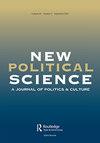Kubi-Nage Hobbes: An Ecocritique
IF 0.5
Q4 POLITICAL SCIENCE
引用次数: 0
Abstract
Abstract This paper uses Thomas Hobbes’ argument for Commonwealth and the existence of the Leviathan as a foil within an immanent critique rejecting the notion of “the state’' presenting an escape from “the state of nature’' as Hobbes characterized it. It does so through a negative dialectic arguing that both conceptually and materially “civilization” needs “the wild,” or “the wilderness” to justify its everyday existence but, instead, rethreads wildness and wilderness through the production of lifeforms necessary for its continued expansion. I motivatie this Lukean ecocritique of Hobbes through Benton MacKaye’s philosophy of regional planning drawing from work in anthropology, sociology, geography, critical animal studies, and environmental studies to argue that “civilization” not only transcends the nation-state but is constituted as material fact through the manifestation of wildness within its environs. The Leviathan co-authors environment but has the power to unleash wildness on a planetary scale – creating localized states of nature, and cannot help but do so. I argue that as the Leviathan attempts to rid itself of wildness, it simply creates “wilderness” elsewhere in its material being through its material needs. This displacement is coupled with a critique recognizing that through Hobbes’ logic, those living within “states of nature,” or civilizational wildernesses have no reason to bind themselves to the Leviathan as it is the Leviathan that threatens their lives by displacing wildness through the rule of artifice. We may, after this examination, conclude that the Leviathan does not end the “State of Nature” but in fact extends and energizes it through manifesting multiple “states of nature” where life may be “solitary, poore, nasty, brutish, and short.”库比-内格·霍布斯:生态批判
摘要本文以托马斯·霍布斯的联邦论证和利维坦的存在作为内在批判的衬托,拒绝“国家”的概念,呈现出对霍布斯所描述的“自然状态”的逃避。它通过一种消极的辩证法来做到这一点,即在概念上和物质上,“文明”都需要“荒野”或“荒野”来证明其日常存在的正当性,但相反,它通过生产其持续扩张所必需的生命形式来重新编织荒野和荒野。我通过本顿·麦凯(Benton MacKaye)的区域规划哲学,从人类学、社会学、地理学、批判动物研究和环境研究的工作中汲取灵感,推动了霍布斯的卢卡斯式生态批评,认为“文明”不仅超越了民族国家,而且通过在其环境中表现出的野性,被构成为物质事实。利维坦是环境的共同作者,但它有能力在全球范围内释放野性——创造局部的自然状态,而且无法控制。我认为,当利维坦试图摆脱野性时,它只是通过其物质需求在其物质存在的其他地方创造了“荒野”。这种位移与一种批判相结合,通过霍布斯的逻辑,那些生活在“自然状态”或文明荒野中的人,没有理由将自己束缚在利维坦身上,因为利维坦通过人工规则取代了野性,威胁着他们的生命。经过这样的考察,我们可以得出结论,利维坦并没有终结“自然状态”,而是实际上通过表现多种“自然状态”来扩展和激活它,在这些状态中,生命可能是“孤独、贫穷、肮脏、野蛮和短暂的”。
本文章由计算机程序翻译,如有差异,请以英文原文为准。
求助全文
约1分钟内获得全文
求助全文

 求助内容:
求助内容: 应助结果提醒方式:
应助结果提醒方式:


